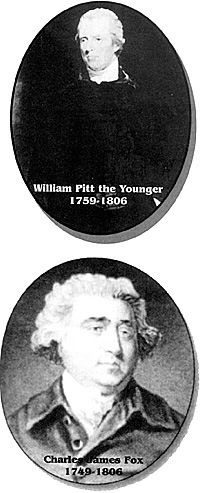Indeed, virtually the only person to oppose the Revolution openly was the statesman
and writer Edmund Burke in his Reflections on the Revolution in France (1790).
The British Government soon became alarmed by two things, however: the impact of French notions of 'self-determination' on the British client states; in the Netherlands, and the contagion of revolutionary ideas. In this the British had much in common with the other European Monarchies who had promptly declared war on France to try to destroy the fledgling republic and replace it with a monarchy once more. So strongly did the European monarchies feel about this that they "treated the French as rabid dogs to be shot." [2]
The French finally declared war on I February 1793, in an act of defiance against all monarchical regimes. The declaration of war was partially intended to encourage British revolutionaries to rebel against the government and to establish a republic of their own.
William Pitt 'the Younger'(1759-1806) had become the Prime-Minister in 1783 at the age of 24,
and it was he who faced the task of governing Britain during the opening of the war with France. This led to defections from the Whigs to the Tories because Charles James Fox (the Whig leader) was determined to "oppose anything and everything Pitt puts before parliament",
[3]
including war with France. At first Pitt anticipated only a "short war" [4] of one or two campaigns when in fact it was to actually last for over twenty years. This attitude has startling parallels with the 'over by Christmas' mentality of the British at the beginning of the First World War against Imperial Germany.
After the beginning of the war governmental concern was focussed on three issues:
In order to prevent a large scale French invasion, the Government fortified the coast with Martello Towers and set up the Militia in England. These measures were followed by Militia Acts in Scotland and Ireland and, despite unsuccessful invasions of Wales (1797) and Ireland (1796 and 1798), they proved to be effective.
During the wars with France, Britain acted as the "paymaster" [5] of Europe by giving subsidies to Napoleon's European adversaries. Between 1793 and 1815, Britain spent 1,500 million pounds sterling on the war, with much of the cost (11 million in
1794 and 32 million in 1797) being met by borrowing until 1797.
In the same year a financial crisis struck Britain and the Government found itself facing a
19 million pound deficit. This led to a sharp rise in inflation, but wages were unable to keep pace. In order to combat this crisis taxes on windows, servants and carriages were trebled, and
in 1799 income tax was introduced for the first time at a rate of 2 shillings (10p) in the
pound.
In order to combat internal dissension and the spread of revolutionary ideas in Britain, Pitt's government instituted a series of repressive policies known as 'Pitt's reign of terror'. These measures attempted (and largely succeeded) to stamp out radicals and societies in favour of peace, and they proved to be particularly harsh in Scotland. Magistrates, industrialists and patriotic societies aided the Government in carrying out their repressive policies locally, but civil unrest was not prevented altogether by these measures.
In 1795 a cold, wet summer followed by a poor harvest caused riots and demonstrations through
out England. In October a shot was fired at the King, while the windows of the Prime Minister's house were broken by members of a mob crying "No war! No famine! No Pitt! No king!" [6] In 1793 and 1794 there were riots in Ireland and in 1798 a full scale rebellion broke out. However, aid promised to the rebels by the French failed to materialise and the rebellion was easily put down by British troops.
Pitt was also in favour of Catholic Emancipation and Anglo Irish unification, two issues that
were to cause friction between the Premier and George III. Although in 1800 the Act of Union was passed and the Irish Parliament abolished, Pitt and the king were unable to see eye to eye on
the issue of Catholic Emancipation. The resultant tension that existed between August 1800 and
March 1801 led to members of Pitt's cabinet ordering further action against the French in Egypt. With the resumption of the war in 1803 Addington's government fell and Pitt returned to power in 1804. One of the first actions of the new Pitt administration was the introduction of the Corn Law, which banned the import of foreign corn and the price of corn rose dramatically as a result.
Despite his neglect of the armed forces before the outbreak of war in 1792, Pitt remained one of Napoleon's most consistent adversaries. He organised three unsuccessful military coalitions against the French Emperor, and he was opposed to the peace treaty signed by Addington in 1801. However, his formation of the coalitions may have proved Pitt's undoing. The defeat of the Austro-Russian army (and thus the Third Coalition) at Austerlitz in 1805 is said to have hastened his premature death in 1806.
William Pitt led Britain through most the first fourteen years of its conflict with Napoleon, and was successful in staving off financial ruin and preventing the spread of revolution and radicalism to Britain. Despite the failure of the three coalitions that he organised, his foreign policy set a trend that was to be followed by his successors of the next ten years.
Pitt's repressive attempts to prevent the spread of radical ideas pushed democratic societies either into obscurity or into alliances with genuine 'oppressed' groups such as the Irish and the working classes. The war itself polarised political thought in Britain into 'revolutionary' and 'loyalist'. 'Pitt's Reign Of Terror' also marked the end of upper-class liberalism in Britain and
of the Scottish enlightenment, and was followed by thirty years of fairly consistent repression. In addition the Militia Acts led to Britain becoming an armed camp for much of the war. There were constant drafts into the militia, and despite the fact that few served abroad 210,000 died between 1792 and 1815.
Thus although he was successful in his domestic aims, he alienated much of the population because of his repressive policies. He also did not live to see the defeat of Napoleon, a thing that had been the main aim of his foreign policy.
The Oxford Illustrated History of Britain (K.O. Morgan ed.)
[1] K.O. Morgan. Ed., The Oxford Illustrated History Of Britain p. 433
 The French Revolution was greeted with a general mood of enthusiasm amongst British intellectuals. Its supporters included many celebrities of the time such as James Watt (the inventor of the steam engine), Joseph Friestle (a Presbyterian minister and political commentator), and writers like Wordsworth, Coleridge and Robert Burns. Even the
British government were not excessively concerned about the events in France, for it was generally considered that "at worst (events) would weaken the old enemy; at best it would create another constitutional state." [1]
The French Revolution was greeted with a general mood of enthusiasm amongst British intellectuals. Its supporters included many celebrities of the time such as James Watt (the inventor of the steam engine), Joseph Friestle (a Presbyterian minister and political commentator), and writers like Wordsworth, Coleridge and Robert Burns. Even the
British government were not excessively concerned about the events in France, for it was generally considered that "at worst (events) would weaken the old enemy; at best it would create another constitutional state." [1]
i) the threat of invasion
ii) the cost of the war
iii) combatting internal dissension. This was an attempt to prevent Pitt being replaced by the pacifically minded Henry Addington. Finally in March 1801, Pitt resigned over the issue. He was replaced by Henry Addington, who signed a short lived peace treaty with France.
This was an attempt to prevent Pitt being replaced by the pacifically minded Henry Addington. Finally in March 1801, Pitt resigned over the issue. He was replaced by Henry Addington, who signed a short lived peace treaty with France.
BIBLIOGRAPHY
The Chronicle of Britain
On The Napoleonic Wars (Dr. David Chandler)
The Napoleonic Sourcebook (P. J. Haythornthwaite)
The Longman Companion to Napoleonic Europe (Clive Emsley)
The Oxford History Of The French Revolution (William Doyle)
NOTES
[2] K.O. Morgan. Ed., Ibid., p.434
[3] The Chronicle Of Britain, p.768
[4] Ibid., p. 768
[5] P. J. Haythornthwaite, The Napoleonic Sourcebook, p. 195
[6] The Chronicle Of Britain, p. 773
Back to Age of Napoleon 29 Table of Contents
Back to Age of Napoleon List of Issues
Back to MagWeb Master List of Magazines
© Copyright 1998 by Partizan Press.
This article appears in MagWeb (Magazine Web) on the Internet World Wide Web.
Other military history articles and gaming articles are available at http://www.magweb.com